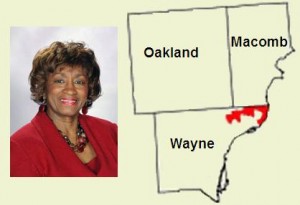
State Sen. Martha G. Scott and Michigan's 13th State Senate District
State Sen. Martha Scott doesn’t know if she’s going to make another bid for Michigan’s 13th Congressional District. After all, the Highland Park Democrat still has campaign debts from the 2008 cycle to settle.
But one thing is clear to the first African-American woman elected mayor in Michigan: “I have much more experience in different offices than she has had,” Scott said, referring to U.S. Rep. Carolyn Cheeks Kilpatrick of Detroit, who eked out a narrow 1,700-vote victory in the Democratic primary’s tough three-way race that also involved former State Rep. Mary Waters.
Waters, who came within a few points of beating Kilpatrick, is already planning a rematch. But Scott, who is term-limited in the state Senate, is undecided but in a recent interview said she hasn’t rejected the idea of a 2010 congressional run.
Waters, meanwhile, said she hopes she can talk with Scott before she makes a decision about 2010 — and perhaps convince her not to jump in.
“It would be nice if she and I could sit down and work this thing out,” Waters said in an interview, explaining that if Scott hadn’t been in the picture last year, she would have “absolutely” been able to knock off Kilpatrick, who was especially vulnerable because of the corruption drama involving her son, Kwame Kilpatrick, then the scandal-tarnished mayor of Detroit.
In the meantime, Scott has been choosing her words carefully and sounds increasingly like a potential candidate.
One local leader who thinks Scott will throw her hat into the ring is David Bullock, president of the Highland Park NAACP. “She’ll defiantly run again,” he said. “She’s a career politician.”
While the 13th Congressional District takes in a large swath Wayne County from Wyandotte downriver through much of Detroit, Hamtramck and Highland Park to the Grosse Pointes and Harper Woods, Scott represents a legislative district that covers a tiny section of the 13th District, an arc that cuts through northeastern Detroit connecting Highland Park with the wealthier Grosse Pointe suburbs.
Scott said the only reason she ran in 2008 was because supporters in Grosse Pointe asked her to run. “Otherwise I never would have ran,” she said.
“That’s interesting because we are both being encouraged by people in Grosse Pointe,” Waters said. “There are people throughout the state who are encouraging me. And I don’t take that lightly.”
Harry Kalogerakos, a past president of the Grosse Pointe Democrats and a parliamentarian with the 13th District Democrats, said it may be too early to measure whether Kilpatrick, Waters or Scott has an edge with Democrats in the Pointes. “I haven’t really talked to anybody who’s thinking that far ahead yet. … Really, one of the things on our agenda is looking forward to the [Grosse Pointe] elections in November 2009, not whats happening for 2010 yet.”
Second Thoughts on Her Cobo Vote
As the Detroit City Council and the interim mayor, Ken Cockrel, continue to wage war over a plan to transfer control of Detroit’s Cobo convention center from the city to a five-member regional authority, Scott has been looking back at her vote in the state Senate that enabled the deal to go forward before it hit sparked major fireworks between leaders in Detroit.
Scott said that when the Cobo legislation came before the state Senate in January, she didn’t know what she was voting for since the bill’s language changed during a voting process that lasted 24 hours. “When I voted on it, I thought it was a seven-member board where Wayne County had two votes and Detroit had two,” she said. “Because I had not heard from any of the [Detroit] council members, I just assumed that it was something they supported.”
Next time around, should it come back for additional consideration in Lansing, Scott said would not vote for the Cobo deal in its current form.
Tough Decisions
Scott contends that as the former mayor of Highland Park, she knows the pains associated with local governments making deep cuts to public services. In Scott’s case, Highland Park’s finances were so bad that the city went into state receivership. “Our library was closed; they took all of our services away; we didn’t have a police or fire department,” she said.
Making dramatic service cuts can be a tough pill to swallow, but it’s necessary, something that requires strong leadership. She said that Pontiac, which recently slipped into state receivership, is a repercussion of not cutting enough city services. “You have to run a city like a business,” she said.
Since Highland Park is currently one of the most dilapidated cities in the state, it is viable for economic stimulus dollars for projects such as home weatherization to conserve energy.
Scott said Highland Park would be getting stimulus money but warned of the potential of mismanagement as the city has a track record of giving work to irresponsible contractors. “So often when monies go through cities, these contractors will not do the very best job,” Scott said. “We have to be careful who we bring into our community.” Based on past mishaps with contractors in Highland Park, progress of stimulus finds needs to be closely monitored, she said.



